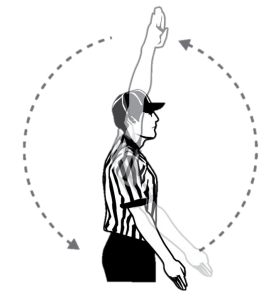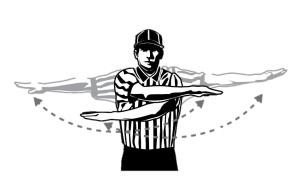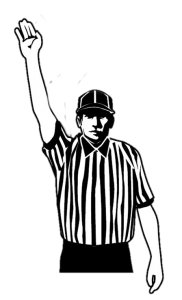As an official you have three responsibilities: keep the game safe, keep the game fair, and to act in a professional manner. The difficult part comes when you make a necessary and appropriate safety or fairness call and one sideline rants and raves. Maintaining your cool when the crowd is booing, players are grumbling and coaches are complaining is not easy. Knowing the rules, being in the right spot, looking professional are all well and good, but what you need in these situations are solid game management skills. Here are ten tips to help you to better manage a game: Be professional, in the right spot, focused, calm, brief, open, quick, humble, ready to meet the moment, and in control.
 The first thing you need to realize is that officials manage the game; they do not control it. We react to what happens. If we are lucky, we react before something bad happens. More often, we react after an incident occurs. To manage a game effectively, you need to manage people: players, coaches, table personnel and sometime even spectators.
The first thing you need to realize is that officials manage the game; they do not control it. We react to what happens. If we are lucky, we react before something bad happens. More often, we react after an incident occurs. To manage a game effectively, you need to manage people: players, coaches, table personnel and sometime even spectators.
We have a number of tools in our toolbox. The most obvious being your whistle and flag. Less obvious but much more important are your communication skills. The better you can communicate what you want coaches, players, and game personnel to do, the more likely they are to do it.
Be Professional
 Your interactions with players, coaches and table personnel begin well before you arrive on the field.
Your interactions with players, coaches and table personnel begin well before you arrive on the field.
-
- Have you been reviewing the rule book? Talking with mentors about game situations? Watching film?
- Did you send an email to the home team’s coach and your crew confirming the game site and time?
- Do you know where your partner is and where to meet?
- Are you all dressed in neat, clean and identical uniforms?
- Did you inspect the field and the goals?
- Did you fill out a GLOA certification card?
- Did you introduce yourself to the coaches, and conduct your coach’s certifications in a timely manner?
- Did you inform the coach when you would ask for captains?
- Did you ask about the National Anthem?
- Did you conduct the coin toss when you said you would?
- Did you certify the table personnel?
The coaches expect you to look the part and to do your job, and if you deviate even slightly from what coaches, players and fans expect, you have opened yourself up to criticism before the game has even started.
Be in the Right Spot
 Employing proper mechanics is essential to good game management. Coaches and players may not have a firm grasp of mechanics but they are less likely to argue a call, the closer you are to the play. DO NOT WALK. As referees we need to be in the right spot and we need to demonstrate that we are working hard to get the best angle to see the play. Hustle throughout the contest, from start to finish.
Employing proper mechanics is essential to good game management. Coaches and players may not have a firm grasp of mechanics but they are less likely to argue a call, the closer you are to the play. DO NOT WALK. As referees we need to be in the right spot and we need to demonstrate that we are working hard to get the best angle to see the play. Hustle throughout the contest, from start to finish.
Be Focused
![]() Being in the right spot won’t help you if you are looking in the wrong place. Focus on your area of responsibility. If you are working with an experienced crew you need to trust them to do their job! Do not ball watch! During live ball play concentrate on your keys: on ball and off ball, goal and crease, the shooter or passer.
Being in the right spot won’t help you if you are looking in the wrong place. Focus on your area of responsibility. If you are working with an experienced crew you need to trust them to do their job! Do not ball watch! During live ball play concentrate on your keys: on ball and off ball, goal and crease, the shooter or passer.
During dead balls, remain focused on the players. Keep an eye on the goal scorer and the defenders. Be vigilant as the teams cross and move to their huddles during time outs.
You will miss things, but missing an offsides in transition is better than the late hit on the shooter or the goalie or two players jawing and shoving after a goal. Make sure that if you are going to call something in your partner’s area, that it is BIG. Don’t go fishing in someone else’s pond for technicals right in front of them. That is there area and their job! Let them do it.
Be Calm
 When speaking with coaches, be calm and composed; watch your tone and your body language. Choose words that avoid confrontations and do not demean the person you address. If you are trying to control behavior, the last thing wanted is to incite more misbehavior. How you say something is often more important than what you say. Avoid sarcasm; it is unprofessional and easily misinterpreted by coaches. You do not want to throw gasoline on the fire.
When speaking with coaches, be calm and composed; watch your tone and your body language. Choose words that avoid confrontations and do not demean the person you address. If you are trying to control behavior, the last thing wanted is to incite more misbehavior. How you say something is often more important than what you say. Avoid sarcasm; it is unprofessional and easily misinterpreted by coaches. You do not want to throw gasoline on the fire.
You may simply be explaining why you made a call or what a player did, but your tone may give the exact opposite impression. When reporting penalties do so in a calm and controlled manner! The volume at which the words are spoken also has an effect. NEVER report an angry foul. Your goal is to keep everyone calm. Your volume should be loud enough to communicate but not so loud as to confront or to incite.
Be Brief
In the same vein as being calm, be brief. Once the game starts, focus on what you need to communicate to manage the game and no more. Saying too much will get you in trouble more often than saying too little.
Remember, your goal is to: have a safe fair game. It is not to win arguments or punish players, coaches or fans.
Be Open
 The rules do not require you to address questions from the coaches unless it is a coach’s challenge (Rule 7:13). But do not make the mistake of refusing to talk with them at all. If a coach, even an assistant, has a question and asks in a respectful manner, it is in your best interest to keep the lines of communication open. Coaches need and deserve information on what is happening. And remember assistant coaches become head coaches. You need to develop these professional relationships because you will work these folks down the road.
The rules do not require you to address questions from the coaches unless it is a coach’s challenge (Rule 7:13). But do not make the mistake of refusing to talk with them at all. If a coach, even an assistant, has a question and asks in a respectful manner, it is in your best interest to keep the lines of communication open. Coaches need and deserve information on what is happening. And remember assistant coaches become head coaches. You need to develop these professional relationships because you will work these folks down the road.
Coaches are going to talk. Yes, every coach is trying gain an advantage and influence. That is part of the game. They are going to disagree with you. They are going to yell and scream. “That was a slash!” “How can you not call that?” “Ward!” “They’re offsides!” “He’s in the crease!” You do not need coaches to agree with your every call. It is NEVER going to happen. So as far as most coaches comments are concerned, ignore them and do not respond. You do not always need to be talking. Learn to listen! Sometimes coaches just need to vent. Let them. For the most part, treat the yelling and complaining as white noise.
A great tip is that when you hear a coach screaming, ask your partner what they had. “Jeremy, was that a shot?” or “Was that tipped by the defense?” You may know the answer and your partner may the answer, but now it looks as if you are addressing a coach’s concerns without having to change your call.
Be Quick

The best way to get a coach and players to stop complaining is to restart the play quickly. Once the ball is in play, players tend to play and coaches tend to coach.
The added advantage is that once play has started you must now move away from the table area and into position.
Be Humble

You will screw up. Get over it. Own it. Deal with it.
Do not try and hide behind the stripes. Do not pretend it did not happen. How you handle making a mistake can have a huge impact on your ability to manage the game. “Coach, I missed that one,” goes a long way. If it is in your power to fix it, then do so. (See Rule 7:13 Correction of Errors).
Be Ready to Meet the Moment
 There are times when you do need to raise your energy level. If you have a close call you need to meet the moment and sell the call! Now, this is not for all calls. If it is abundantly clear that blue will be awarded the ball on the endline you don’t need to make a fuss.
There are times when you do need to raise your energy level. If you have a close call you need to meet the moment and sell the call! Now, this is not for all calls. If it is abundantly clear that blue will be awarded the ball on the endline you don’t need to make a fuss.
But there are times when you do need to make a big deal with your signal. Crease violations, wiping of goals, and close endline plays, are all good examples. In these situations, be loud and give big signals!
Be in Control
 Sometimes, these tips and techniques are not enough or the behavior on the field requires that you take more serious action. If a coach is out of control, the most important thing is that you remain in control. If you can, you want to avoid going nuclear. Immediately flagging someone for Unsportsmanlike Conduct for arguing with you leaves you with no other option left and a second USC will result in an ejection. Be aware of how your game is changing and be ready to reassess how you are managing it.
Sometimes, these tips and techniques are not enough or the behavior on the field requires that you take more serious action. If a coach is out of control, the most important thing is that you remain in control. If you can, you want to avoid going nuclear. Immediately flagging someone for Unsportsmanlike Conduct for arguing with you leaves you with no other option left and a second USC will result in an ejection. Be aware of how your game is changing and be ready to reassess how you are managing it.
Use the Ramp. The ramp is a series of options you have when dealing with coaches.
-
- Talk it through with the coach, if he disagrees with your brief explanation so be it. Restart play quickly and get the game moving. Hopefully he will get back to coaching his team. You may even want to get away from the coach and move to the far side.
- If that does not alleviate the issue, your first option is a verbal warning: “Coach, that’s enough.” Be calm and quiet. You don’t want to appear to threaten a coach or player.
- You next option is a loose-ball or dead ball conduct foul. This gives the ball to the opposing team without putting anyone in the box.
- Next is the 30 second conduct foul. You are now giving the opposing team a man-up opportunity. The in-home serves these bench penalties. Do so calmly and quietly. No angry flags.
- You next option is the nuclear option, a non-releasable USC for one, two or three minutes. And finally a second USC which by rule must be a 1-minute NR USC for a coach or a 3-minute non-releasable ejection foul for a player.
Follow these steps and try and leave yourself as many options as possible when dealing with players and coaches. You never want to paint yourself into a corner; i.e “Coach, the next word out of you gets a flag!” Sometimes, you can let the coach vent and move on. Its just white noise.
That being said, there are lines that cannot be crossed. These include:
-
- Profanity and racist comments
- Player or coach questioning your integrity as an official.
- Threats
- Out of control behavior
This type of behavior demands that you skip the first few steps of the ramp and move immediately to USC.
Remember, your goal is to keep the game safe, keep the game fair and to act in a professional manner. So the next time you find yourself on the field surrounded by an angry crowd, disgruntled players and irate coaches, use these ten tips to better manage people and in turn, manage the game.
Play on!
Greg Hite
GLOA Lead Trainer
